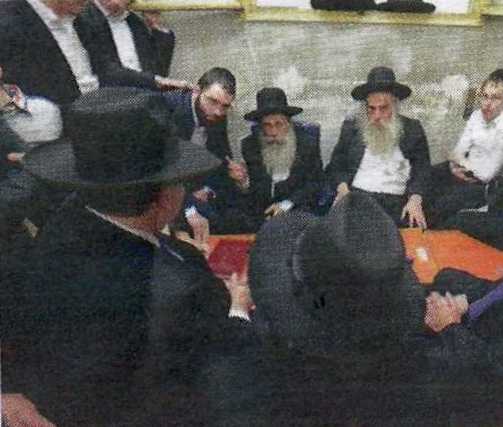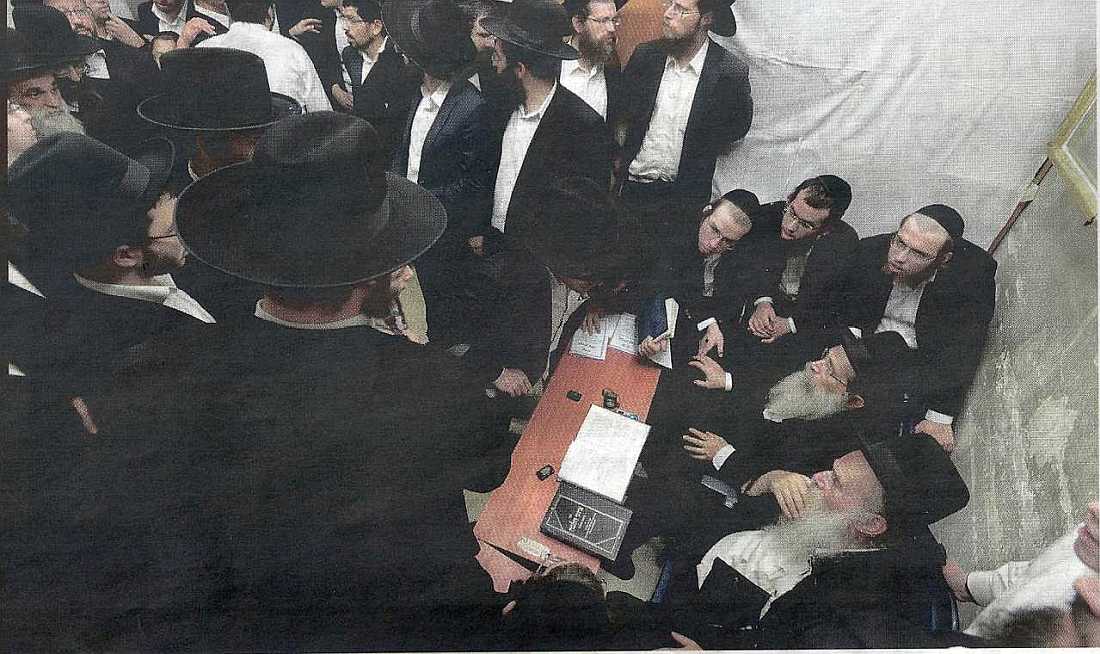The Sons of Maran zt"l at the Shiva

Thousands of people came to comfort the Shteinman family during the Shiva period for Maran HaRav Aharon Yehuda Leib Shteinman zt"l. Here are some of the stories told during those visits.
"One must ignore eighty percent"
HaRav Yechiel Zucker from the seminary in Elad: Maran said to me regarding several instances about which I consulted him, asking how I should react. He said to me in Yiddish: "You must ignore eighty percent - Vehis'alamta [it says in the posuk and Chazal say] sometimes you can ignore things."
I asked him what happens if they see me and realize that I know but am overlooking, in which case they might conclude, "If I am silent, it means that I condone it and it doesn't bother me." He replied emphatically, "Don't be so conceited. Stop educating every single one."
I asked again, "But this is Torah and I seek to understand."
He then told me to sit down and began explaining: "Know that a lot of bacteria circulate in the world which everyone swallows and inhales constantly. Hashem created within man a system of insulation and protection, the immune system. Sometimes, this system fails; a person's body becomes infected and requires help from antibiotics. But a person who requires medication on a regular basis is in trouble, oy vavoy to him!
"This applies to the soul as well. Hashem instilled an evil inclination within us and the body must develop a system to deal with it. One cannot take medication all the time, or be alert and on guard consistently. You must provide the right tools but enable them to cope on their own."
To Answer an 80-year-old Question
HaRav Mendel Sheinin zt"l learned bechavrusa with Maran zt"l when he lived in Kfar Saba. His son came to the Shiva.
HaRav Sheinin said:
In 5769 I told over to the Rosh Yeshiva a story about my father. My father studied in Chevron in 5688 or 5689. The Imrei Emes once visited the yeshiva and saw my father as a young bochur, studying. He asked him what he was studying and my father replied, `Sanhedrin.'
The Rebbe asked him a question: `We know that an `eida' is comprised of ten individuals, which we learn from the meraglim, where Yehoshua and Kalev were not included in their group. But this presents a difficulty since it states in Talmud Yerushalmi regarding the posuk, `Each, each [man] to his tribe,' that we see from here that each tribe had two representatives. So how can we reconcile that an eida is comprised of ten men and not twenty-two?'
He asked the question but did not provide an answer. My father posed this question to many people over the years, scholars to be sure, but no one could resolve it.
When I told it to him in 5769, Maran thought for two minutes and then said: `There is a Tosafos in Eruvin 6 which addresses the six hundred thousand [ribo] which comprises the entire Jewish camp. Tosafos asks there: Why do we not count the women and children? And Tosafos answers: Because they are not explicitly mentioned in the posuk. We can conclude, therefore, that one only counts and reckons what is mentioned in the posuk. This answer can apply to the question about the meraglim. We only take into account what is explicitly stated in the Torah.
"She will yet emerge from this!"
The Mashgiach HaRav Chizkiyohu Mishkovsky:
There are many wonder stories to tell about Maran, and one can spend hours speaking of these alone. His family knows that miracle tales abounded without cease. Let me tell one:
There was once a religious Jew who became strengthened. His daughter suddenly became ill and was on the verge of death. The doctors told the family to remain by her side since her hours heralded an imminent passing. The father, naturally broken, called up the Lev L'Achim hotline, begging that they send someone in to Maran to ask him to pray for her, which they duly did. Maran stated: `She will live.'
The messenger was surprised. He had been prepared to hear words of encouragement and solace, certainly not an announcement that she would live. He asked the Rosh Yeshiva if he would agree to speak to the father on the telephone, and he consented. They called up the father and Maran said to him over the phone, `Why are you so alarmed? She will yet emerge from this.'
And so it was. Within a few days, she was back on her feet."
"I Need Merits!"
Rabbi Chananya Cholek, head of Ezer MiZion, said:
I was privileged to be present at Rebbe's soul passing. I was finally able to understand, for the first time, what is often stated: `The angels overcame the earth-bound ones...'
He lived his entire life on a thin thread but during those [final] moments, even that fine thread was not present. Nevertheless, when they attempted resuscitation, his pulse returned but ceased a few moments later. They revived him again, which was uncommon. We felt then that the holy soul, hanging by a thread, was battling against angels [on one side] and earthly beings [on the other] to seize the aron kodesh.
Rabbi Cholek continued:
Every year we had the privilege of his visit on Chol Hamoed when he came to participate in the Simchas Beis Hashoeva which we organized for sick children. One time, HaRav Yitzchok Levinstein said to me, `Know that for several days following the Rosh Yeshiva's visit here, he looks very pained. He literally suffers from the sight of sick children.'

A scene during the Shiva




